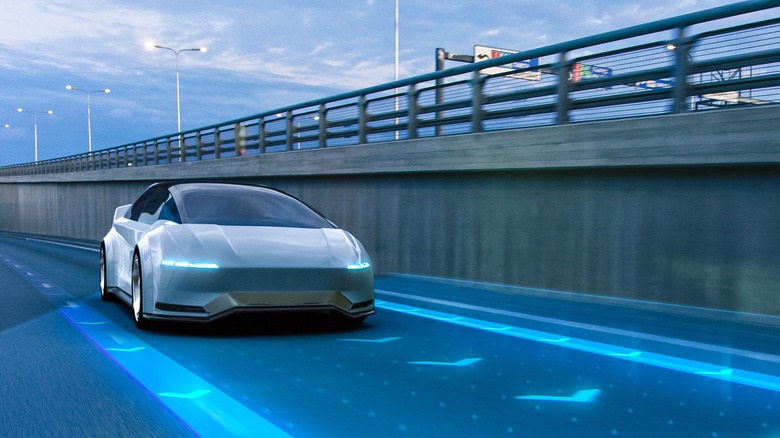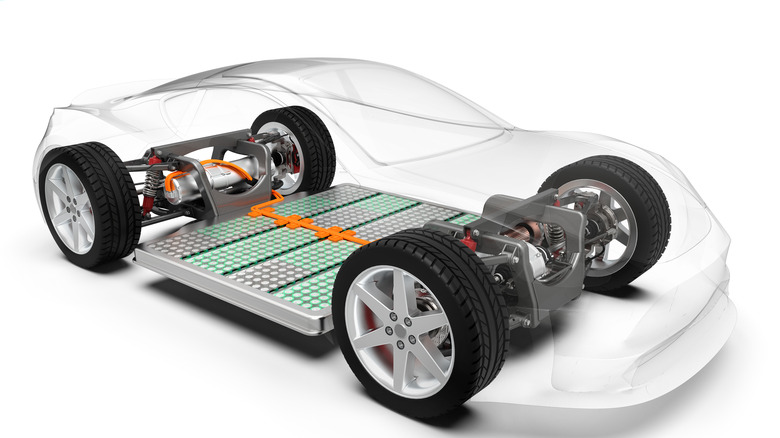The Reason Why Electric Cars Are So Quiet
As automotive designs become increasingly modern and sleek, it's getting harder to tell whether a vehicle is gas- or electric-powered. However, the guessing game comes to an end the moment you step inside the car and notice the stark difference in noise levels. Electric vehicles (EVs) exhibit a noteworthy reduction in noise compared to gas-driven cars. This provides a multitude of benefits, not only for the driver but also for the environment.
Drivers and passengers get a more peaceful experience on the road as there are fewer unwanted sounds to distract them. Beyond the individual benefit, the larger community and environment also stand to gain from the reduced noise pollution. Streets become less of a madhouse, providing a more harmonious setting for the neighborhood. But why exactly are electric vehicles so quiet, and is their nearly silent operation entirely advantageous? Let's dive into the technicalities behind the EV's hushed presence and explore the broader implications of this technology.
The beauty of electric motors
Why electric cars tend to be quiet boils down to what's running them: electric motors. Electric motors operate by converting electricity into your car's power, and this process is notably smooth and nearly silent. On the other hand, internal combustion engines (ICEs) found in gas-driven vehicles generate power through the forceful process of combustion. During the combustion process, fuel and air are mixed, compressed, and ignited, resulting in a controlled explosion that ultimately drives the car. This controlled explosion is what produces the engine noises you hear.
Apart from the violent combustion process itself, ICEs are also equipped with a host of mechanical parts that move repeatedly and augment the car's overall noise level. In contrast, electric motors have only a handful of moving components, so the vibrations and noise are naturally minimized.
However, it's important to note that while electric vehicles are noticeably less noisy than their gasoline-powered counterparts, this doesn't necessarily mean that they're entirely silent. You may still notice a couple of noises when driving or riding an EV. For one, there's the whirring sound the spinning motor makes during acceleration. You might also hear the distinct noise of your brakes while parking. Additionally, EVs can get as loud as gasoline cars when driven at high speeds, primarily because of the wind, tire, and road noises.
The silent threat of electric vehicles
Although EVs can be rather noisy at high speeds, they're still relatively silent when driven at low speeds. This comes with a serious safety concern, especially for visually impaired pedestrians who are dependent on their ears to navigate their surroundings. Because they can't easily hear when an EV is approaching, they're at risk of potential accidents. According to a survey by low-vision and blindness service provider Vision Australia and Monash University Accident Research Center, 35% of the visually impaired participants were hit or almost hit by an electric or hybrid car.
In response to this risk of collisions, the National Highway Traffic Safety Administration (NHTSA) of the U.S. Department of Transportation mandated that electric and hybrid vehicles driving at up to 18.6 miles per hour (30 kph) should emit audible warnings. This alert system ensures that pedestrians are made aware of the presence of EVs, helping them take necessary precautions to avoid oncoming cars. Each electric vehicle brand has its own alert, so you'll hear a variety of sounds, from a deep spaceship/UFO hum to a vacuum cleaner-like rumbling.


